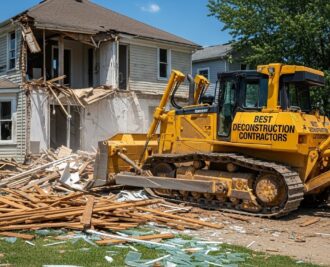Build Reuse Industry Data

Build Reuse Industry Data: Driving Decisions with Verified Market Insights
At Deconstruction Development Partners (DDP), we recognize that reliable industry data is essential for shaping the future of sustainable development. Our Build Reuse Industry Data services provide municipalities, developers, and nonprofits with the statistics, trends, and compliance insights they need to make informed decisions. From tracking salvage and material reuse rates to measuring economic impact, we deliver transparent, verified data that supports tax benefits, ESG reporting, and municipal development strategies. Our approach goes beyond basic reporting—we translate raw numbers into actionable intelligence that drives projects forward. By combining national industry studies, regional case data, and project-specific reporting, DDP empowers clients with the knowledge to design better programs, secure funding, and maximize community benefits. For us, Build Reuse Industry Data is not just about numbers—it’s about building trust, credibility, and measurable progress in every deconstruction initiative.
Choosing DDP for Build Reuse Industry Data means gaining access to unmatched expertise in sustainable construction and deconstruction markets. We integrate national databases, nonprofit research, and our own field-tested insights into comprehensive reporting systems tailored to each client’s needs. Our data services support everything from donation valuations and IRS compliance to municipal workforce planning and environmental reporting. We ensure information is accurate, timely, and aligned with industry benchmarks, giving stakeholders the confidence to present results to auditors, investors, and community leaders. By converting industry research into compliance-ready reports, DDP helps clients unlock funding, prove impact, and strengthen ESG strategies. With us, data is more than background—it is the backbone of successful, transparent, and future-focused development projects.
How Build Reuse Industry Data Works
The process begins with identifying client goals, whether it’s demonstrating compliance, securing funding, or measuring ESG outcomes. DDP gathers relevant datasets from trusted sources such as national deconstruction reports, nonprofit research, and municipal case studies. We then analyze this data in the context of the client’s project, producing clear, audit-ready documentation that highlights compliance, economic benefits, and sustainability outcomes. Our reports include salvage material volumes, market resale values, landfill diversion rates, and workforce development impacts. Once compiled, this data is delivered in formats designed for stakeholders, ranging from federal agencies to community boards. By combining industry intelligence with project-specific analysis, DDP ensures every client has defensible, actionable data that supports compliance and demonstrates measurable community value.
Data Collection & Research
Analysis & Benchmarking
Reporting & Compliance
- Provides verified deconstruction and reuse industry statistics
- Supports ESG, compliance, and sustainability reporting
- Integrates with IRS donation documentation and valuations
- Demonstrates economic and workforce development impacts
- Backed by national studies and municipal case data
- Delivers investor-ready, audit-compliant reports
- Helps secure grants and private funding opportunities
- Transforms data into actionable community strategies
With Build Reuse Industry Data services from DDP, clients gain access to the intelligence needed to prove impact, unlock opportunities, and achieve compliance. Our services go beyond raw statistics by tailoring data to the needs of property owners, municipalities, nonprofits, and investors. We turn data into persuasive documentation that demonstrates transparency, accountability, and measurable results. Whether supporting IRS audits, ESG reporting, or community case studies, our reports stand up to the highest standards of review. At DDP, we believe data is not just evidence—it is a catalyst for stronger decisions and sustainable change. By connecting local outcomes to national industry benchmarks, we empower communities to grow smarter, greener, and stronger with every project.
Frequently Asked Questions About Build Reuse Industry Data
What is Build Reuse Industry Data and why is it important?
Build Reuse Industry Data refers to verified statistics, benchmarks, and case studies that measure the value and impact of deconstruction and material reuse. This data includes metrics such as landfill diversion rates, salvage values, and community job creation. It is important because it provides municipalities, developers, and nonprofits with evidence to support tax benefits, funding requests, and ESG reporting. At DDP, we specialize in transforming raw industry data into audit-ready reports that demonstrate measurable community impact. By relying on credible, research-backed information, stakeholders can make informed decisions and showcase sustainable outcomes to investors, auditors, and regulators.
How does DDP collect and validate industry data for clients?
At DDP, we gather data from a wide range of reliable sources, including nonprofit research, federal case studies, and national deconstruction market reports. Our team then validates the information against local project benchmarks to ensure accuracy and relevance. We also incorporate on-the-ground data from material salvage operations, donation programs, and municipal records. Every dataset is carefully reviewed for compliance readiness, making it suitable for IRS audits, ESG disclosures, and investor presentations. This layered approach
Who benefits from Build Reuse Industry Data services?
Build Reuse Industry Data benefits a wide range of stakeholders. Property owners and developers use it to substantiate tax deduction claims and prove environmental impact. Municipalities rely on it to design and evaluate sustainability programs while demonstrating compliance to regulators. Nonprofits leverage it to highlight community benefits and secure grants, while investors use the data to measure ESG alignment. At DDP, we tailor our reporting to each group’s needs, ensuring data is delivered in formats that strengthen credibility and decision-making. Ultimately, anyone involved in deconstruction, redevelopment, or sustainable construction can benefit from access to this trusted data.
How does Build Reuse Industry Data support ESG and compliance reporting?
Industry data plays a critical role in Environmental, Social, and Governance (ESG) reporting by providing measurable evidence of sustainability efforts. For example, data on landfill diversion, material reuse, and workforce development can be directly tied to ESG metrics. At DDP, we structure industry data into compliance-ready reports that align with both IRS and investor requirements. This ensures that municipalities, developers, and nonprofits can present clear, verifiable results when applying for grants, filing taxes, or showcasing ESG performance. By integrating data into compliance frameworks, we help clients prove their commitment to transparency, accountability, and long-term sustainability.









